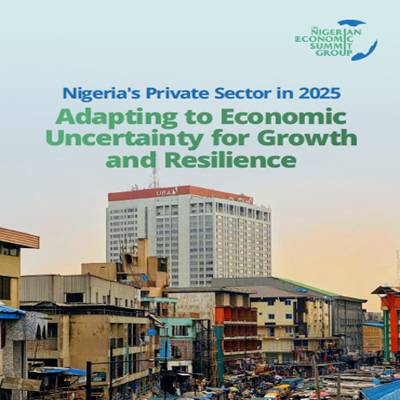Posted Fri, Mar 7, 2025 1:42 AM
Download Report (665 downloads)
In 2024, Nigeria's economic growth remained fragile, reflecting deep-seated structural weaknesses and macroeconomic volatility. Despite reform efforts, investment levels remained low, productivity growth stagnated, and macroeconomic imbalances persisted, compounding the challenges in the labour market. Additionally, deteriorating living standards heightened economic distress, undermining efforts to achieve inclusive growth and poverty reduction.
A significant barrier to Nigeria's economic transformation journey is the weak performance of the private sector, which has struggled to expand its productive capacity and make a substantial contribution to the economy in recent years. Businesses continue to grapple with operational inefficiencies, weak investment flows, sluggish innovation, and constrained productivity. These issues are further exacerbated by economic and structural challenges such as foreign exchange shortages, widespread insecurity, inadequate infrastructure, and limited market access. These structural constraints have escalated operating costs, reduced business competitiveness, and suppressed overall private sector performance.
Consequently, the economy remains in a precarious state, fostering an uncertain business climate in 2025, which Nigeria's private sector must navigate to ensure growth and resilience. This report presents a comprehensive analysis of the private sector's performance in 2024 and offers strategic insights for navigating the uncertainties and opportunities of 2025. It is structured into 6 key sections:
· Section 1: Introduction – Establishes the context for the report and defines its key objectives.
· Section 2: Nigeria's Macroeconomic Overview in 2024 – Analyses key economic and structural challenges that shaped the business environment and contributed to widespread underperformance across sectors.
· Section 3: State of the Private Sector in 2024 – Evaluates business performance trends, drawing insights from the NESG-Stanbic IBTC Business Confidence Monitor (BCM) Index.
· Section 4: Emerging Business Risks for the Private Sector in 2025 – Identifies critical risks and challenges businesses will face in 2025 and provides a roadmap for strategic decision-making.
· Section 5: Key Business Opportunities for the Private Sector in 2025 – Highlights growth prospects, including Nigeria's large consumer market, expanding digital economy, and ongoing economic reforms, which offer avenues for investment and business expansion.
· Section 6: Adaptive Business Coping Strategies for Nigeria's Private Sector in 2025 – Outlines key strategies businesses can adopt to mitigate risks, enhance financial resilience, strengthen customer engagement, improve employee retention, and optimise operational flexibility.
This report serves as a strategic roadmap for fostering a robust market system that empowers the private
sector to drive economic transformation, ensuring Nigeria's growth remains sustainable, inclusive, and resilient.
